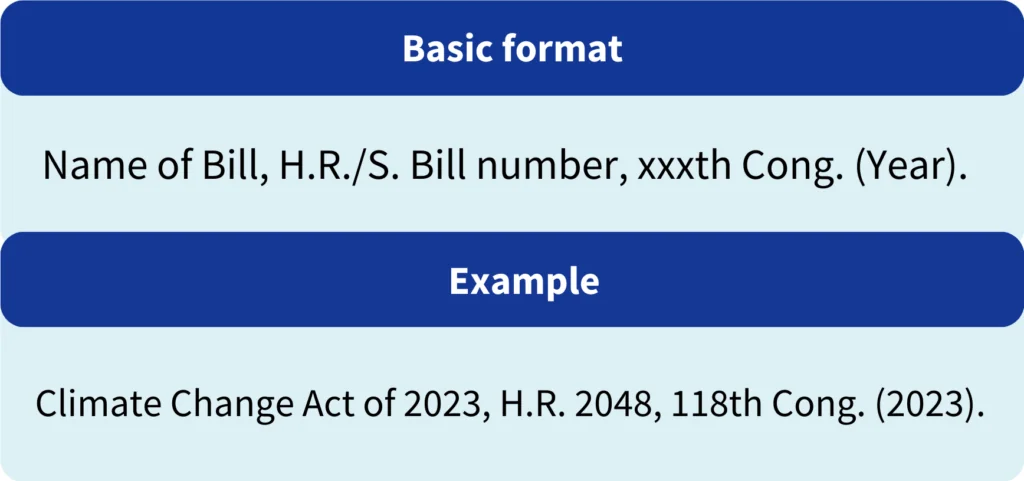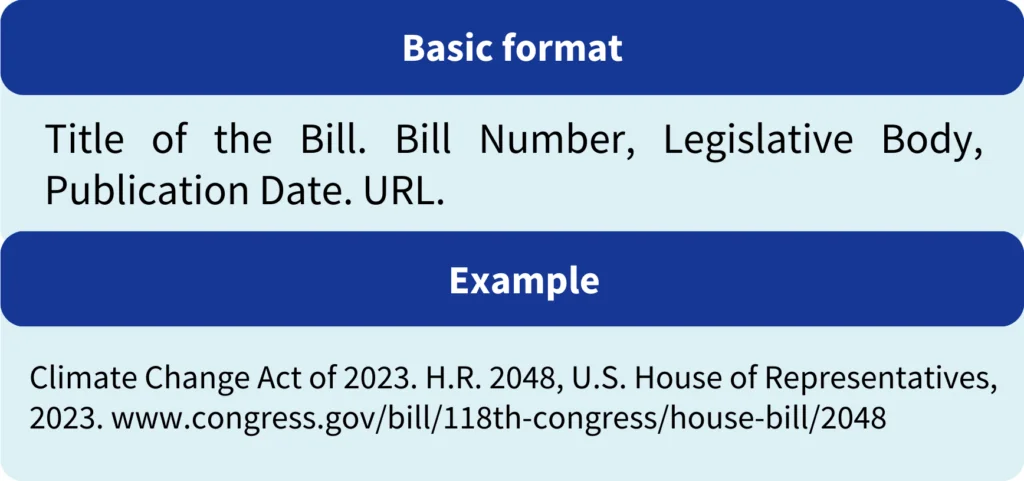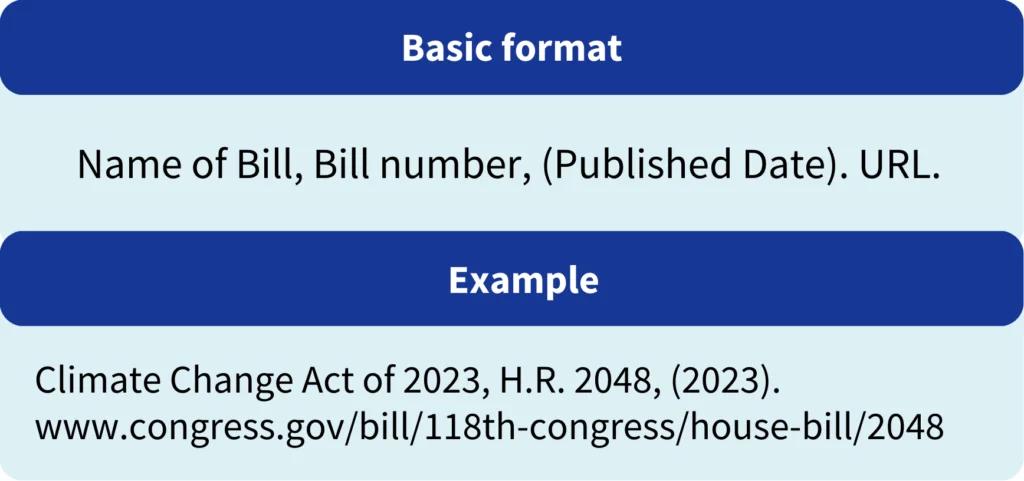If you need to reference legislative documents professionally or just mention them in your scholarly work, knowing the correct way to cite a bill is important. This guide will walk you through different citation styles, like APA, MLA, and Chicago, so you can confidently support your arguments with precise references. Let’s break down the process, offer examples, and help you avoid common mistakes to make your writing solid and credible. Ready?

✅ AI Essay Writer ✅ AI Detector ✅ Plagchecker ✅ Paraphraser
✅ Summarizer ✅ Citation Generator
Citing Bills
A bill is a draft of a law presented for approval to a legislative body. To word it simply, it’s a proposal for new legislation or an amendment to existing legislation. The role of a bill in the legislative process is fundamental; it must pass through various stages of debate and approval before it becomes law. Bills shape everything from economic policy to social norms.
Here’s a quick look at different types of bills:
| 👤 Private Bills | Affect only specific individuals or entities. |
| 👥 Public Bills | Have a broader impact, affecting the general public. |
| 🏛 House Bills | Originated by the House of Representatives. |
| 🗽 Senate Bills | Introduced in the Senate. |
Why Reference Bills?
Citing bills in your writing is important for several reasons. It lends credibility to your work, because your arguments are backed by tangible legislative proposals or enacted laws. Apart from that, it allows readers to trace your sources for verification.
Legally, citing government documents like bills is often necessary to meet transparency requirements in research and publication. This practice provides confidence that discussions and analyses based on legislative texts are accessible and verifiable by everyone. And, more importantly, you keep your integrity as a researcher.
How to Cite a Bill in APA, MLA, Chicago
Citing bills might seem tricky at first, but once you understand the rules, it’s pretty straightforward. Whether you’re writing a research paper, crafting a policy analysis, or simply needing to reference legislative documents, knowing how to cite a bill in various styles like APA, MLA, and Chicago can make your work much clearer and more reliable. Let’s break down how to do this in each citation style.
1. APA Format
In APA format, you need to include the name of the bill, the bill number, the congressional session in which it was introduced, and the source of the bill.

Here, “H.R. 2048” refers to the House of Representatives bill number 2048, introduced in the 118th Congress in 2023. When citing, provide the direct URL to the bill if available.
2. MLA Format
MLA format requires the title of the bill, the bill number, the legislative body, and the publication date.

We can clearly see how to list the bill under MLA standards, including the URL where the bill can be accessed so that readers can find the original source easily.
3. Chicago Style
In Chicago style, you should cite the bill similar to a web document, including the name of the bill, the bill number, the date it was published, and the URL where it was retrieved.

Chicago style focuses on providing a clear path to the original document, much like APA and MLA, but formats the information slightly differently. Make sure that the URL is included so that the bill is easily accessible.
Mistakes to Avoid When Citing Bills
Citing bills correctly can be a bit tricky, but knowing the common mistakes can help you avoid them. We summed up a few frequent errors made when referencing legislative documents and some tips on how to stay away them.
A common oversight is not providing enough detail. When citing a bill, make sure to include all essential information such as the bill number, date, and the specific legislative body (e.g., House or Senate). This will help anyone who reads your work to locate the original source without any trouble.
Another typical mistake is mixing up formats. Depending on whether you are using APA, MLA, or Chicago style, the format for citing bills will vary. You need to stick to the guidelines of the citation style you are using throughout your document to keep it consistent and clear. To avoid this, choose a particular style in the citation machine generator.
Misidentifying the bill’s version can also lead to inaccuracies in your citation. Bills go through several versions before being passed. Be sure to specify which version of the bill you are referencing, whether it’s the introduced, amended, or enacted form!
Forgetting to update the citation can be detrimental, especially if the bill has been recently amended or passed. Always check for the most recent information to make sure your citations reflect the most current data.
FAQ
Follow us on Reddit for more insights and updates.





Comments (0)
Welcome to A*Help comments!
We’re all about debate and discussion at A*Help.
We value the diverse opinions of users, so you may find points of view that you don’t agree with. And that’s cool. However, there are certain things we’re not OK with: attempts to manipulate our data in any way, for example, or the posting of discriminative, offensive, hateful, or disparaging material.